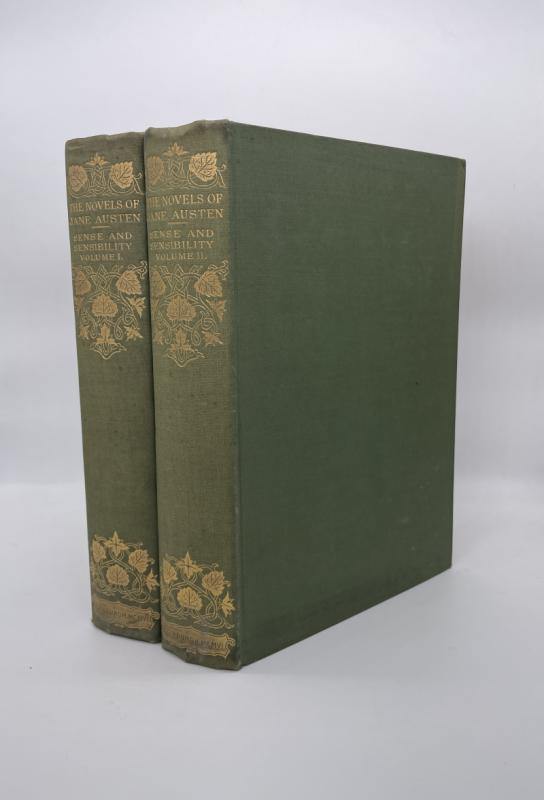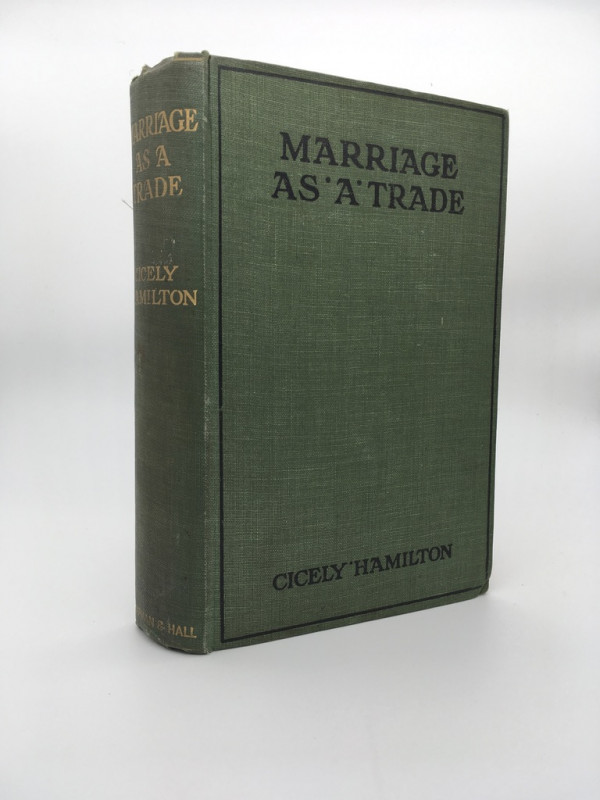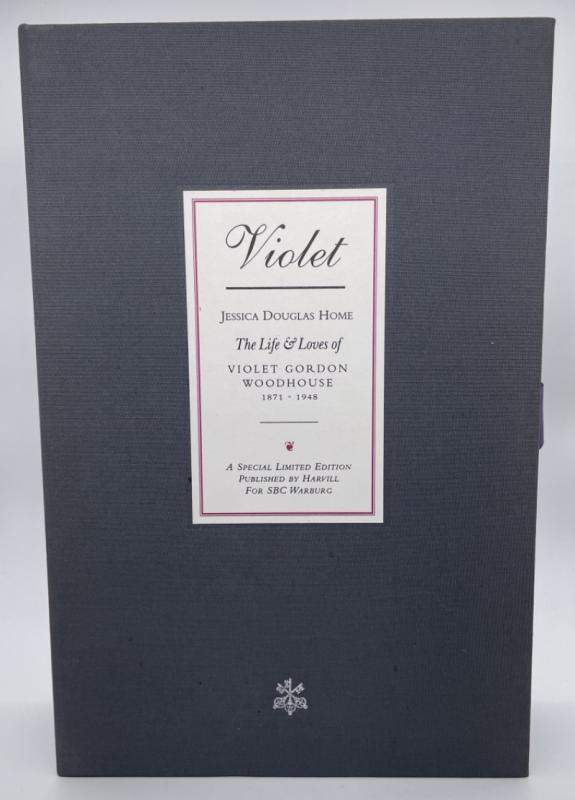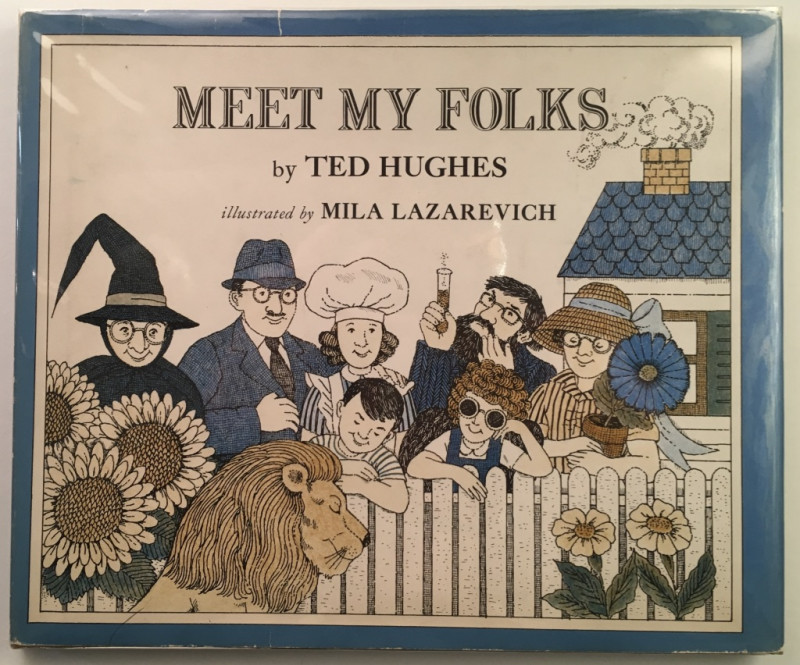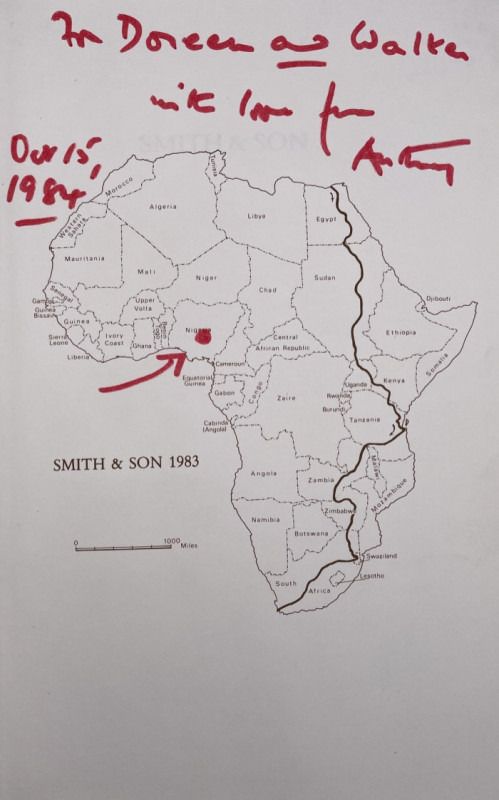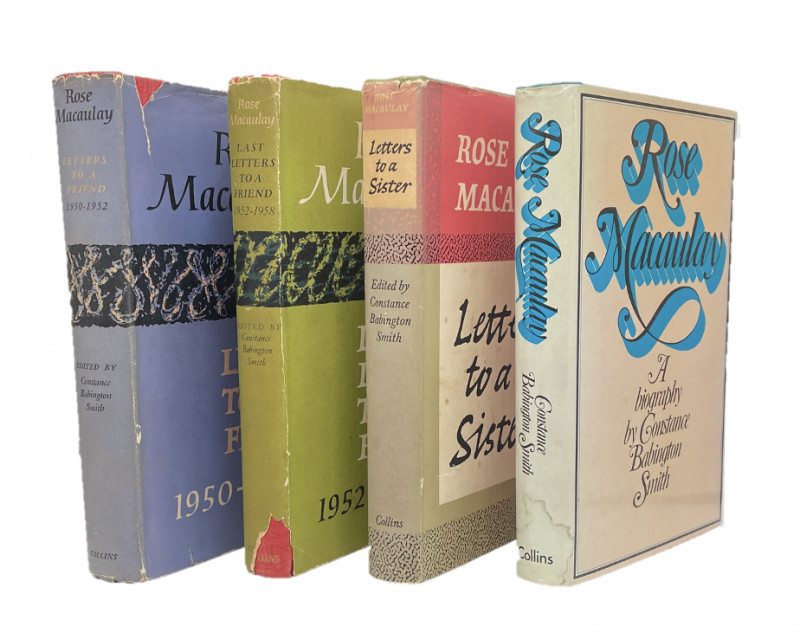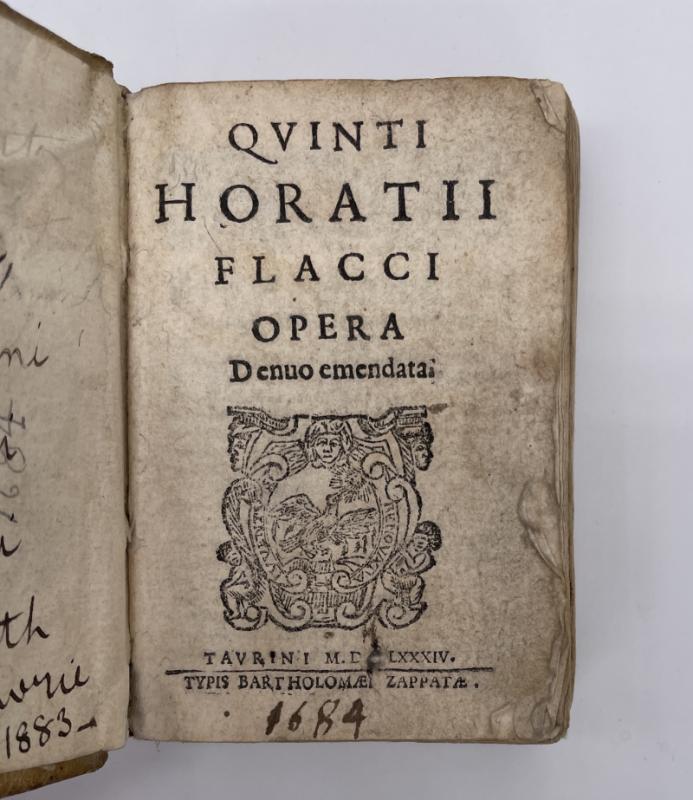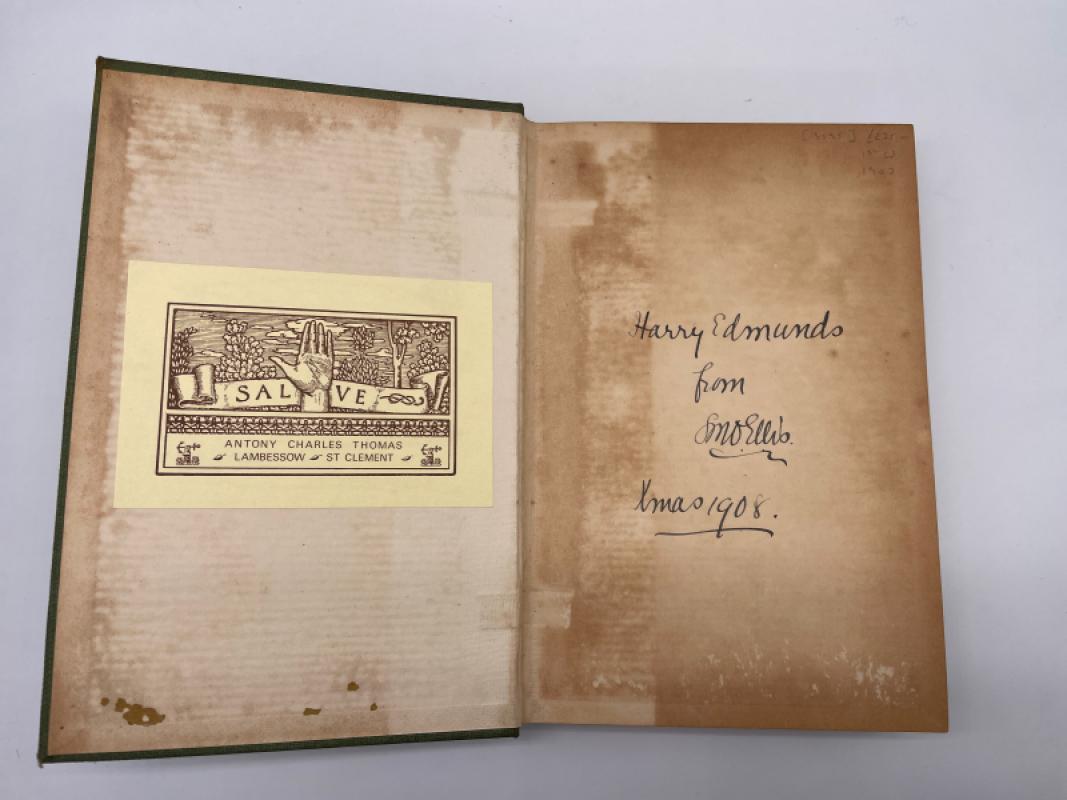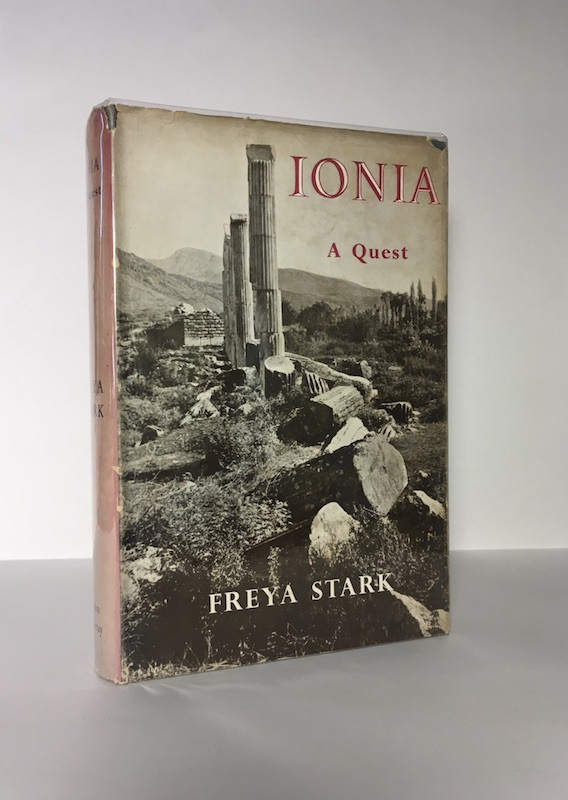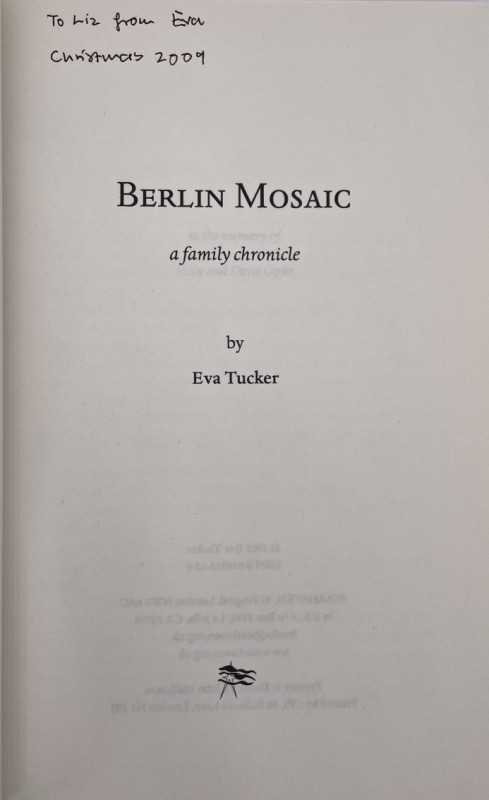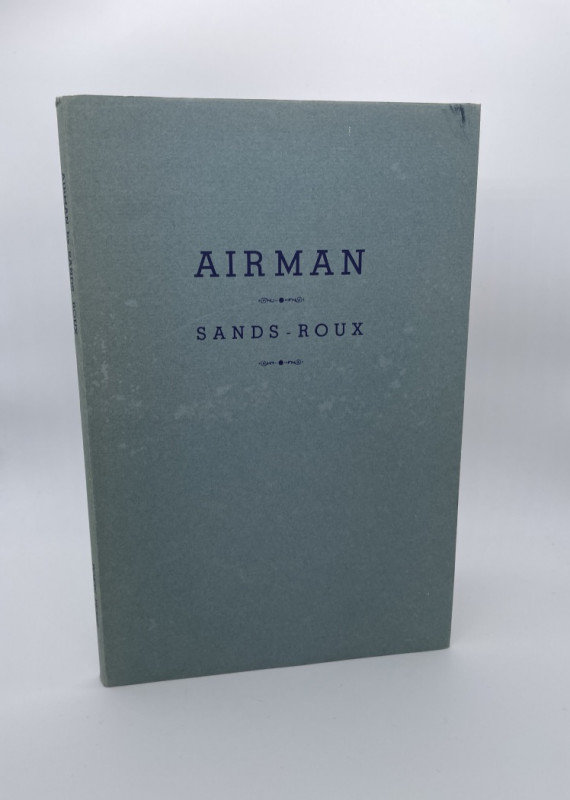The Novels of Jane Austen: Sense and Sensibility (Winchester Edition, Volumes I & II).
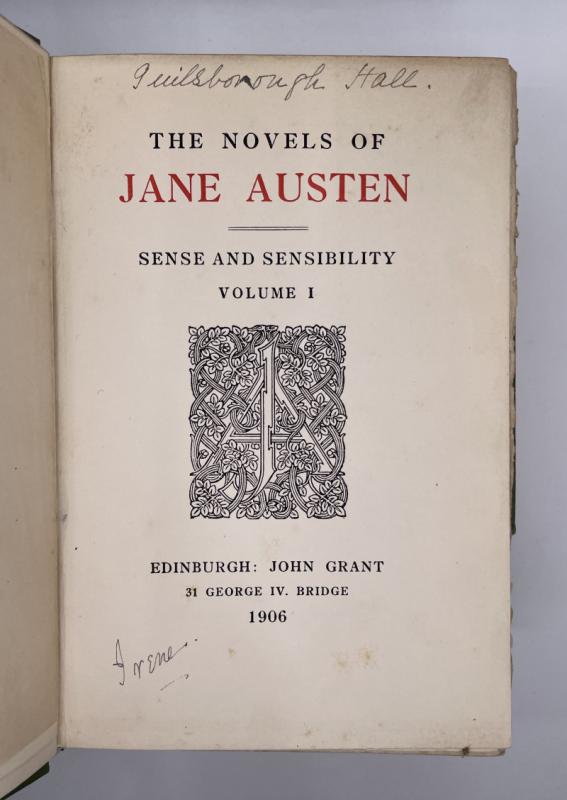


Book Description
WINCHESTER EDITION, IRENE OSGOOD’S COPIES. Two volumes. 8vos, title pages lettered in red and black, featuring decorative foliate ‘JA’ monograms; frontis portrait of Jane Austen to vol. I. Publisher’s green cloth, spines lettered and decorated in gilt. Top edges gilt, others untrimmed. Extremities bruised, sunning to spines and boards, gentle soiling and mottling. Edges toned. ‘The Staff Library, United Dominions Trust Ltd, Bankers: nos. 5 & 6’ book labels to ffeps, pencil location notes: ‘Lounge Hall Book Case’ to ffep and first blank, plus previous bookseller’s pencil notes to vol. I; inscribed in brown ink to title pages: “Guilsborough Hall” and “Irene,” some foxing and soiling, liquid stains to leading margins, heaviest in vol. I. Else, clean. Good+
Dealer Notes
An apt romance-related association copy of the two-volume Winchester edition of Jane Austen’s Sense and Sensibility, from the library of the “colourful” American fin de siècle romance novelist and garden designer, Irène Osgood of Guilsborough Hall, Northampton; and, following her death, from the staff library of the British finance house United Dominions Trust (founded 1919).
Richmond, Virginia-born, Irène Osgood (1869-1922; formerly Nannie Belote) was a popular and prolific novelist, poet, playwright and publisher, as well as an innovative gardener and enthusiastic country sportswoman. A girl and woman of self-transformation who possessed “natural charm and imperiousness” in abundance (a contemporary considered her “one of the most fascinating women I have ever met”), and who didn’t shy from drama, by her late teens the “Southern belle Nannie Irene Belote [had] aggrandized and ennobled herself to Nonie Irène de Belote,” and eloped with the wealthy Colorado coal tycoon, John Cleveland Osgood, becoming his first wife in 1887 (American Aristocracy, 2025). John Osgood established the Cleveland Publishing Company, New York to issue his wife’s writing, and published her first and most well-known novel The Shadow of Desire in 1893. This first outing was fairly well received, except by The Spectator, whose critic was troubled by its suggestive title and the show of female desire, observing: “One married woman is infatuated by [the male protagonist]. Another not only allows him to kiss her, but in the madness of the moment, ‘gives back kisses hot & fast’”.
The Osgoods divorced in 1899 and with her “more than favorable” settlement Osgood bought the Northamptonshire country estate, Guilsborough Hall, “one of the most beautiful houses in the Midlands”. As well as assembling an enviable library (which included the Winchester Edition of Austen’s novels (later disbanded), shelved, apparently, in the Lounge Hall Book Case), Osgood developed and designed Guilsborough’s gardens, winning “the admiration of all the authorities on artistic gardening”. She created “a ‘hanging Italian garden’ on the roof, planted up as a white garden, predating [Vita Sackville-West’s] famous white garden at Sissinghurst in Kent by more than twenty years” (Lyon, 2017).
Osgood remarried twice, her second marriage was short-lived (Capt. Charles Pigott Harvey died unexpectedly), while her third, in 1908 (two years after the publication of this edition of Sense and Sensibility) to Robert Harborough Sherard, the impoverished great-grandson of William Wordsworth and first biographer and friend of Oscar Wilde, proved unhappy, violent and disruptive. They divorced in 1915, following a headline-making trial on both sides of the Atlantic.
While neither their novels nor their lives (indeed, the more critical accounts of Osgood cast her as Willoughby-esque in character and aspiration) have much in common, both Austen and Osgood were dedicated to their writing and each worked concertedly to see and keep their work in print. Both novelists required the help of male relatives to navigate the gendered publishing cultures of their eras, and both felt the need to conceal themselves at particular times, with Austen publishing her novels anonymously and Osgood anonymously founding her own publishing house, John Richmond Limited, to circumvent accusations of literary fraud by Sherard during their divorce proceedings.
A wonderful association copy of Sense and Sensibility, uniting two quite different R/romantic novelists.
Anon (2025) ‘Irene Osgood (1869-1922)’, American Aristocracy; Neil Lyon (2018) ‘Useless Anachronisms?’ A Study of the Country Houses and Landed Estates of Northamptonshire Since 1880 (Northampton: Northamptonshire Record Society).
Richmond, Virginia-born, Irène Osgood (1869-1922; formerly Nannie Belote) was a popular and prolific novelist, poet, playwright and publisher, as well as an innovative gardener and enthusiastic country sportswoman. A girl and woman of self-transformation who possessed “natural charm and imperiousness” in abundance (a contemporary considered her “one of the most fascinating women I have ever met”), and who didn’t shy from drama, by her late teens the “Southern belle Nannie Irene Belote [had] aggrandized and ennobled herself to Nonie Irène de Belote,” and eloped with the wealthy Colorado coal tycoon, John Cleveland Osgood, becoming his first wife in 1887 (American Aristocracy, 2025). John Osgood established the Cleveland Publishing Company, New York to issue his wife’s writing, and published her first and most well-known novel The Shadow of Desire in 1893. This first outing was fairly well received, except by The Spectator, whose critic was troubled by its suggestive title and the show of female desire, observing: “One married woman is infatuated by [the male protagonist]. Another not only allows him to kiss her, but in the madness of the moment, ‘gives back kisses hot & fast’”.
The Osgoods divorced in 1899 and with her “more than favorable” settlement Osgood bought the Northamptonshire country estate, Guilsborough Hall, “one of the most beautiful houses in the Midlands”. As well as assembling an enviable library (which included the Winchester Edition of Austen’s novels (later disbanded), shelved, apparently, in the Lounge Hall Book Case), Osgood developed and designed Guilsborough’s gardens, winning “the admiration of all the authorities on artistic gardening”. She created “a ‘hanging Italian garden’ on the roof, planted up as a white garden, predating [Vita Sackville-West’s] famous white garden at Sissinghurst in Kent by more than twenty years” (Lyon, 2017).
Osgood remarried twice, her second marriage was short-lived (Capt. Charles Pigott Harvey died unexpectedly), while her third, in 1908 (two years after the publication of this edition of Sense and Sensibility) to Robert Harborough Sherard, the impoverished great-grandson of William Wordsworth and first biographer and friend of Oscar Wilde, proved unhappy, violent and disruptive. They divorced in 1915, following a headline-making trial on both sides of the Atlantic.
While neither their novels nor their lives (indeed, the more critical accounts of Osgood cast her as Willoughby-esque in character and aspiration) have much in common, both Austen and Osgood were dedicated to their writing and each worked concertedly to see and keep their work in print. Both novelists required the help of male relatives to navigate the gendered publishing cultures of their eras, and both felt the need to conceal themselves at particular times, with Austen publishing her novels anonymously and Osgood anonymously founding her own publishing house, John Richmond Limited, to circumvent accusations of literary fraud by Sherard during their divorce proceedings.
A wonderful association copy of Sense and Sensibility, uniting two quite different R/romantic novelists.
Anon (2025) ‘Irene Osgood (1869-1922)’, American Aristocracy; Neil Lyon (2018) ‘Useless Anachronisms?’ A Study of the Country Houses and Landed Estates of Northamptonshire Since 1880 (Northampton: Northamptonshire Record Society).
Author
AUSTEN, Jane; [OSGOOD, Irène]; [UNITED DOMINIONS TRUST LTD].
Date
1906
Publisher
Edinburgh: John Grant
Condition
Good+
Friends of the PBFA
For £10 get free entry to our fairs, updates from the PBFA and more.
Please email info@pbfa.org for more information
